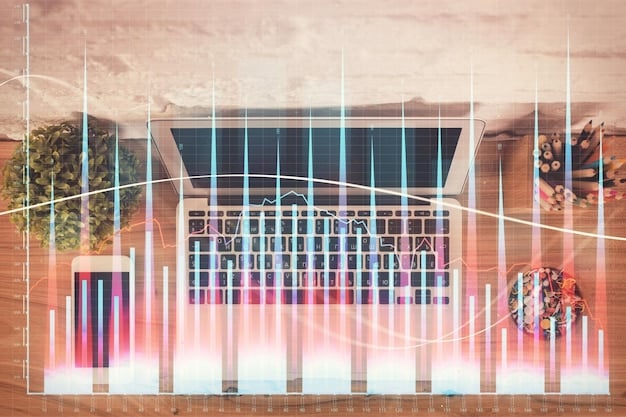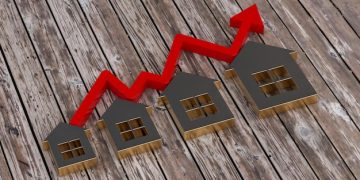Federal Reserve Rate Hike: Impact on US Mortgage Rates

The Federal Reserve’s interest rate hike significantly influences US mortgage rates, potentially increasing borrowing costs for homebuyers and impacting the overall housing market.
The **Federal Reserve Interest Rate Hike: How Will It Affect Mortgage Rates in the Coming Months?** is a critical concern for potential homebuyers and current homeowners alike. Understanding the dynamics between these two factors can significantly impact financial decisions related to housing.
Understanding the Federal Reserve’s Role
The Federal Reserve, often called the Fed, plays a pivotal role in the US economy by managing monetary policy. One of its primary tools is adjusting the federal funds rate, which influences interest rates throughout the country.
What is the Federal Funds Rate?
The federal funds rate is the target rate that the Federal Reserve wants banks to charge one another for the overnight lending of reserves. This rate serves as a benchmark for many other interest rates.
How Does the Fed Influence This Rate?
The Fed influences the federal funds rate through open market operations, reserve requirements, and the interest rate it pays on banks’ reserve balances. By adjusting these tools, the Fed can encourage or discourage lending activity.
A hike in the federal funds rate typically leads to higher borrowing costs for banks, which they then pass on to consumers and businesses in the form of increased interest rates on loans, including mortgages.

The Direct Impact on Mortgage Rates
When the Federal Reserve raises interest rates, mortgage rates usually follow suit. This is because mortgage rates are closely tied to the yield on Treasury bonds, which are influenced by the Fed’s policies.
Conventional Wisdom vs. Market Realities
While there’s a general expectation that Fed rate hikes directly cause mortgage rates to increase, the relationship is not always linear. Market sentiment, economic forecasts, and investor behavior also play significant roles.
The Ripple Effect on Homebuyers
For potential homebuyers, a rise in mortgage rates means higher monthly payments, making homes less affordable. This can lead to a decrease in demand and potentially slow down the housing market. On the other hand, there is more incentive to save money due to higher rates.
Higher mortgage rates mean increased borrowing costs, shrinking affordability for prospective homebuyers. This can lead to fewer sales and a cooling housing market.
Analyzing Recent Fed Actions
To understand the current landscape, it’s essential to analyze the Fed’s recent actions regarding interest rate adjustments and their stated intentions for the near future.
Review of Past Rate Hikes
Examining the historical data of past rate hikes and their corresponding effects on mortgage rates provides valuable insights into potential future trends. For example, looking at rate increases from the last decade might give us clues as to what to expect.
Current Economic Indicators
Keeping an eye on key economic indicators such as inflation, employment rates, and GDP growth can help forecast the Fed’s next moves and anticipate their impact on mortgage rates.
- Inflation: An increase could indicate the Fed will raise rates.
- Employment: Strong employment might lead the Fed to tighten monetary policy.
- GDP: Healthy growth could support higher interest rates.
Recent rate hikes by the Federal Reserve aim to combat inflation, but they inevitably impact mortgage rates, affecting the housing market and homebuyers.

Future Predictions and Factors Influencing Mortgage Rates
Predicting future mortgage rates involves analyzing various economic factors and эксперts’ forecasts. Understanding these elements can help people make informed decisions about buying or refinancing a home.
Expert Opinions and Forecasts
Financial analysts and economists often provide forecasts on the direction of mortgage rates based on their assessment of the economy and the Federal Reserve’s likely actions.
Geopolitical Events
Geopolitical events, such as international conflicts, trade disputes, or global economic shifts, can create uncertainty and impact financial markets, subsequently affecting mortgage rates.
Supply and Demand in the Housing Market
The balance between the supply of available homes and the demand from buyers also plays a crucial role. A tight housing market with limited inventory can put upward pressure on prices and, indirectly, on mortgage rates.
Future mortgage rates will depend on the Fed’s monetary policy decisions, influenced by inflation, economic growth, housing market dynamics, and वैश्विक events.
Strategies for Homebuyers and Homeowners
Given the fluctuating interest rate environment, homebuyers and homeowners should consider various strategies to navigate the market effectively.
Locking in Mortgage Rates
Locking in a mortgage rate guarantees a specific interest rate for a set period, protecting borrowers from potential rate increases while they finalize their home purchase. The lock-in period usually lasts from 30 to 60 days.
Adjustable-Rate Mortgages (ARMs)
Consider that an adjustable-rate mortgage (ARM) typically offers a lower initial interest rate than a fixed-rate mortgage but the rate adjusts periodically based on market conditions.
Refinancing Options
Homeowners with existing mortgages can explore refinancing options to take advantage of lower interest rates or to switch from an adjustable-rate mortgage to a fixed-rate mortgage.
Homebuyers can lock in rates to secure predictable payments, while homeowners might refinance to benefit from lower rates or switch to a fixed-rate mortgage.
Long-Term Implications for the Housing Market
Federal funds rate hikes can have profound and lasting effects on the United States housing market, influencing affordability, construction activity, and overall economic growth.
Impact on Home Affordability
Increased mortgage rates make homeownership less accessible for first-time buyers and those with limited financial resources, thereby reducing demand in the housing market.
Effects on Construction and Development
Higher borrowing costs can discourage developers from initiating new construction projects, leading to a decrease in the supply of new homes and potentially exacerbating housing shortages.
- Decreased demand: Higher rates can cool down the buying frenzy.
- Slowed construction: Developers might pause projects.
- Economic ripple: The entire sector can feel the pressure.
Long-term effects include decreased affordability, slowed construction, and broader economic consequences, reshaping the housing market’s dynamics.
Expert Strategies for Navigating Rate Hikes
Navigating the financial landscape amid Federal Reserve interest rate hikes requires careful planning and strategic decision-making. Here are some expert strategies designed to help individuals and businesses effectively manage their finances and minimize potential risks.
Diversification of Investments
Diversifying investments across various asset classes, such as stocks, bonds, and real estate, can help mitigate risk. When interest rates rise, some asset classes may perform better than others, so diversification can cushion the impact on an investment portfolio.
Debt Management and Reduction
Prioritizing the management and reduction of debt is particularly important during periods of rising interest rates. High-interest debt, such as credit card balances, becomes more expensive as rates increase, so paying down these debts can lead to significant savings over time.
Diversification, debt management, and financial consultations can help individuals navigate the complexities of rising interest rates effectively.
| Key Point | Brief Description |
|---|---|
| 🏠 Mortgage Rates | Increase following Fed rate hikes. |
| 💰 Home Affordability | Decreases due to higher borrowing costs. |
| 📈 Economic Impact | Influences construction and overall growth. |
| 📊 Expert Strategies | Include diversification and debt reduction. |
FAQ
▼
When the Federal Reserve raises interest rates, mortgage rates generally increase, leading to higher monthly payments for new homebuyers. Existing homeowners with adjustable-rate mortgages may also see their payments rise.
▼
Locking in a mortgage rate can be a good strategy if you anticipate further rate increases, as it guarantees a specific interest rate. Assess current market conditions and your financial situation before deciding.
▼
An ARM is a mortgage where the interest rate is periodically adjusted based on market conditions. It often starts with a lower initial rate but can increase over time, making it riskier than a fixed-rate mortgage.
▼
Refinancing involves replacing your existing mortgage with a new one, often to secure a lower interest rate or change the loan term. This can lower monthly payments or save on interest over the life of the loan.
▼
Key economic indicators to watch include inflation rates, employment data, and GDP growth. These factors can influence the Federal Reserve’s decisions regarding interest rates, impacting mortgage rates accordingly.
Conclusion
Understanding the relationship between the Federal Reserve’s interest rate hikes and mortgage rates is crucial for making informed decisions in the housing market. By staying informed, exploring different mortgage options, and seeking expert advice, homebuyers and homeowners can navigate this complex environment effectively.





